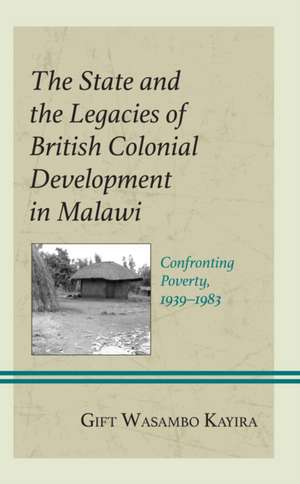The State and the Legacies of British Colonial Development in Malawi
Autor Gift Wasambo Kayiraen Limba Engleză Hardback – 15 feb 2023
Preț: 636.37 lei
Preț vechi: 826.47 lei
-23% Nou
121.98€ • 128.03$ • 100.61£
Carte tipărită la comandă
Livrare economică 23 ianuarie-06 februarie 25
Specificații
ISBN-10: 1666921653
Pagini: 290
Ilustrații: Illustrations, unspecified; Tables; Halftones, Black & White including Black & White Photographs
Dimensiuni: 157 x 235 x 22 mm
Greutate: 0.63 kg
Editura: Globe Pequot Publishing Group Inc/Bloomsbury
Descriere
What were the origins of British ideas on rural poverty, and how did they shape development practice in Malawi? How did the international development narrative influence the poverty discourse in postcolonial Malawi from the 1960s onwards? In The State and the Legacies of British Colonial Development in Malawi: Confronting Poverty, 1939-1983, Gift Wasambo Kayira addresses these questions. Although by no means rehabilitating colonialism, the book argues that the intentions of officials and agencies charged with delivering economic development programs were never as ill-informed or wicked as some theorists have contended. Raising rural populations from poverty was on the agenda before and after independence.
How to reconcile the pressing demand of stabilizing the country's economy and alleviating rural poverty within the context of limited resources proved an impossible task to achieve. Also difficult was how to reconcile the interests of outside experts influenced by international geopolitics and theories of economic development and those of local personnel and politicians,. As a result, development efforts always fell short of their goals.
Through a meticulous search of the archive on rural and industrial development projects, Kayira presents a development history that displays the shortfalls of existing works on development inadequately grounded in historical study.
